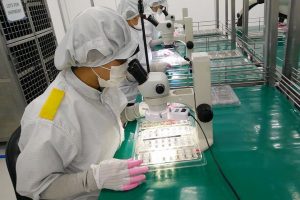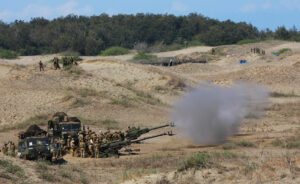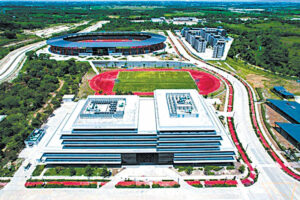US tariffs offer ‘window’ to raise PHL job quality

By Chloe Mari A. Hufana, Reporter
LABOR LEADERS said the government has a window of opportunity to improve job quality and “decent employment” while recalibrating its trade strategy in response to the US tariffs.
Federation of Free Workers President Jose G. Matula said the US tariffs could inadvertently open doors for labor-rich economies like the Philippines, particularly in electronics manufacturing and subcontracting.
The Philippines was initially set a 17% tariff by the US, though the White House has since paused the new tariff for 90 days as delegations from countries that did not retaliate head to Washington to negotiate new rates.
In 2024, the Philippines exported $12.14 billion worth of goods to the US, over half of which ($6.43 billion) consisted of electronics.
With manufacturers looking to diversify away from China, Mr. Matula noted the opening for the Philippines to absorb some of the electronics manufacturing exiting the Mainland, describing the industry as labor-intensive with strong growth potential.
“The Philippines, being part of the global electronics supply chain, could see increased subcontracting, particularly in component assembly and semiconductor packaging,” Mr. Matula said via Viber.
To fully prepare the Philippines and its workforce, Mr. Matula urged the government to curb electricity prices, ensure a just transition to renewable energy, and cut red tape for agro-industrial development.
“We need these improvements not just to attract foreign direct investment but to proactively support our own micro, small and medium industries,” he added.
He emphasized the need to ensure that jobs created are decent work, not precarious, low-wage employment.
He called for upskilling, particularly in electronics assembly, robotics, automation, and precision engineering.
“Smart manufacturing is becoming the standard. Workers must be digitally literate, adaptable, and AI-ready. Government, employers, and labor groups need to collaborate now to align training programs with these needs,” he said.
University of the Philippines Diliman School of Labor and Industrial Relations Assistant Professor Benjamin B. Velasco said the lower tariffs will open a window for more production in the country for electronics and apparel.
“It can lead to more investment and more employment,” he told BusinessWorld via Facebook Messenger chat.
“However, the reason the Philippines got slapped lower tariffs compared to other Southeast Asian countries is that we have a lower trade surplus with the US due to the fact that we import a lot from them,” he added. “Meaning, we are a dependent and weak economy compared to Southeast Asian neighbors.”
Over 75 countries contacted the US Trade Representative to negotiate new tariffs Treasury Secretary Scott Bessent said.
While the initially announced tariffs remain on the books, their actual enforcement will be delayed until mid-July, pending further review and consultations.




